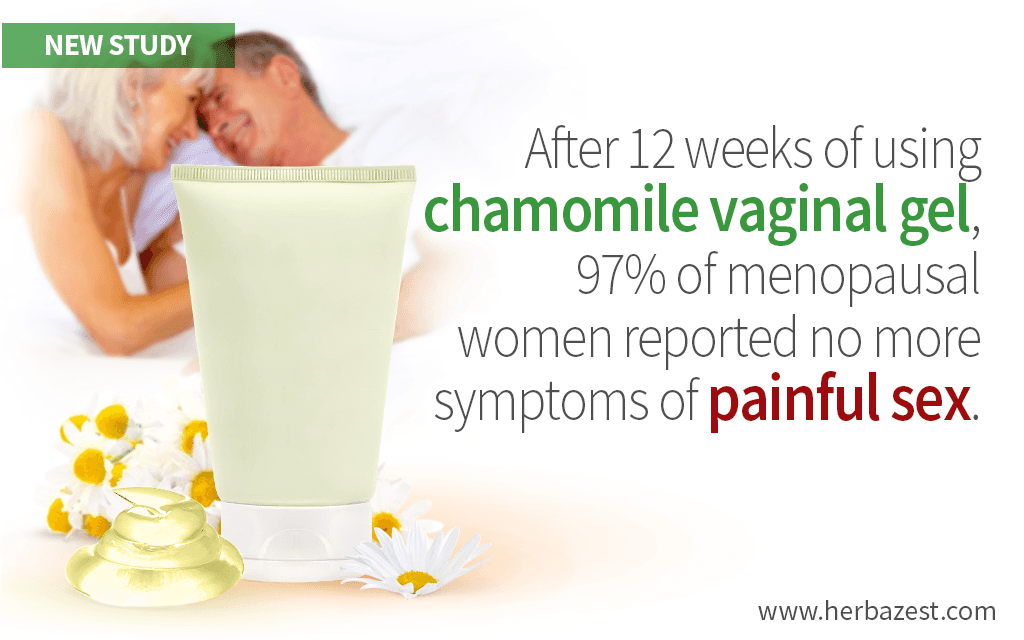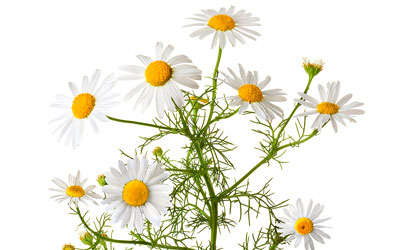Dyspareunia, or painful sex, is perhaps one of the least openly talked about menopausal discomforts. Women are oftentimes embarrassed to mention it to their doctors, effectively never undergoing treatment. If they do, they are most commonly offered vaginal estrogen cream.
However, some women may prefer to stay off hormone therapy and seek an herbal alternative. Thanks to its phytoestrogenic content, chamomile could potentially make for a good ingredient in natural products for painful sex in menopausal women.
With that in mind, researchers of this 2020 clinical trial aimed to evaluate the effects of chamomile gel on improving painful sex and sexual satisfaction.
The Study
To test out their hypothesis that chamomile gel can relieve painful sex, researchers recruited 96 postmenopausal women, between the ages of 45 and 65. Reported symptoms related to vaginal atrophy, such as vaginal dryness and painful sex.
Once participants were randomly assigned to three groups, they were given one of three treatment regimens to follow for 12 weeks: a 5% chamomile vaginal gel, conjugated estrogen vaginal cream, or the placebo gel.
Women were instructed to apply one gram daily at nighttime for two weeks, followed by one gram twice a day for 10 more weeks. They underwent several follow-ups during the trial to measure the outcomes and ensure regimen safety.
The Results
At the beginning of the study, the average sexual satisfaction score was 66.8 in the chamomile gel group and 65.5 in the estrogen gel group. In 12 weeks, the scores increased to 88.4 and 88.7, respectively. No significant improvements in sexual satisfaction scores were noted in the placebo group.
Pain intercourse scores also substantially changed in the following patterns:
In the chamomile group, 30% of women started with severe dyspareunia, 53% reported moderate symptoms, and 16.7% had mild discomforts. After 12 weeks, 96.7% had no symptoms, and 3.3% had mild symptoms. None of the women reported severe or moderate discomforts.
In the estrogen group, 29.6% began with severe symptoms, 55.6% with moderate symptoms, and 14.8% with mild ones. At the end, 18.5% still had severe symptoms, and 51.9% had moderate discomforts. The percentage of women with mild symptoms increased to 29.6%, but no women ended the trial without reporting any symptoms.
No significant improvements were noticed in the placebo group.
What Does this Mean?
The results of this study demonstrate very clearly that chamomile gel is effective for painful sex during menopause. It also led to great improvements in overall sexual satisfaction among participants.
This is fantastic news for postmenopausal women who choose to avoid hormone therapy, whether for preference or medical reasons. Vaginal dryness and painful sex have shown to affect women on numerous levels, including leading to sexual dysfunction, body image problems, self-esteem issues, and relationship difficulties.1
Other herbs that are rich in phytoestrogens and may benefit menopausal women are soy, red clover, black cohosh, and flax.
Sources
- Avicenna Journal of Phytomedicine, Evaluation of the influence of chamomile vaginal gel on dyspareunia and sexual satisfaction in postmenopausal women: A randomized, double-blind, controlled clinical trial, 2020
Footnotes:
- American Family Physician. (2014). Dyspareunia in Women. Retrieved January 12, 2021 from https://www.aafp.org/afp/2014/1001/p465.html





